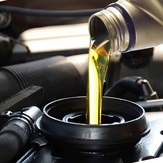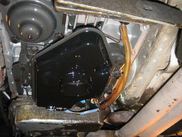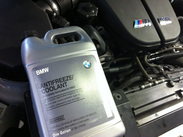Preventative Vehicle Maintenance in Calgary
Preventative Maintenance may be a dirty subject in some people's minds, but it's a perfectly acceptable and politically correct means of keeping vehicles in good running condition. Checking fluid levels regularly and changing the fluids and filters periodically can minimize the risks of breakdowns and prolong the life of your car, including its engine, transmission, cooling system and brakes. So if you are driving a "maintenance challenged" vehicle, isn't it about time to start paying closer attention to the fluids and filters?
IF YOU IGNORE PREVENTATIVE MAINTENANCE NOW, YOU WILL BE
FACED WITH LARGER SERVICE BILLS LATER!!
FACED WITH LARGER SERVICE BILLS LATER!!

Motor oil - It not only lubricates the engine, but also cools, cleans and protects it. But the oil itself can't do all of these jobs without some help. Nearly half a pint of various additives are added to the typical quart of oil to improve the oil's ability to resist heat, friction, oxidation and contamination. Short trip driving is especially hard on oil because the engine never warms up enough to boil off the moisture that accumulates inside the crankcase. The moisture comes from combustion gases that blow by the piston rings (the older the engine, the greater the amount of blow by). Most of these gases are removed by the Positive Crankcase Ventilation (PCV) system. But in a cold engine much of the moisture condenses and ends up in the oil. Water reacts with oil to form sludge and acids, and the result is accelerated engine wear. The only way to get rid of the accumulated moisture, acids and sludge is to change both oil and filter. The filter only removes suspended solids such as dirt, carbon and metal particles -- not moisture, acids or sludge.
The oil and filter change intervals recommended by the vehicle manufacturers vary depending on the vehicle application and how the vehicle is driven, we however RECOMMEND CHANGING ENGINE OIL EVERY 7,000km to 10,000km, using Synthetic Oil.
Turbocharged engines likewise require more frequent oil changes because of the high temperatures encountered in the turbocharger bearings. A turbo can spin at tremendous speed (over 100,000 rpm in many instances). This, combined with the heat of the exhaust gases passing through the housing, creates an environment that accelerates oxidation of the oil.
You might upgrade to a synthetic motor oil or a synthetic blend. Synthetics are more expensive, but provide superior hot and cold temperature performance compared to petroleum based conventional motor oils. They are especially good for turbocharged and high output engines. Synthetic oils also experience less viscosity breakdown over time.
The oil and filter change intervals recommended by the vehicle manufacturers vary depending on the vehicle application and how the vehicle is driven, we however RECOMMEND CHANGING ENGINE OIL EVERY 7,000km to 10,000km, using Synthetic Oil.
Turbocharged engines likewise require more frequent oil changes because of the high temperatures encountered in the turbocharger bearings. A turbo can spin at tremendous speed (over 100,000 rpm in many instances). This, combined with the heat of the exhaust gases passing through the housing, creates an environment that accelerates oxidation of the oil.
You might upgrade to a synthetic motor oil or a synthetic blend. Synthetics are more expensive, but provide superior hot and cold temperature performance compared to petroleum based conventional motor oils. They are especially good for turbocharged and high output engines. Synthetic oils also experience less viscosity breakdown over time.

Automatic Transmission Fluid - automatic transmission fluid is rarely changed for preventative maintenance, yet is often the cause of premature transmission failure and ends up costing customers the most amount of money when overlooked. Considering how expensive a transmission is to replace, the cost of changing the fluid and filter periodically is peanuts. Most vehicle owner's manuals do not specify a change interval for automatic transmission fluid-unless the vehicle is used for towing. WE RECOMMEND CHANGING TRANSMISSION OIL AND FILTER EVERY 50,000km to 75,000km or sooner. And yes even so the the dealer recommended "lifetime warranty," all oils breakdown and these oil must be changed. When you don't change your Oil, even at the dealers recommendation, its costing you money and making them money - so its easy to figure out why there recommendation is what it is. If the transmission is leaking fluid from the pan gasket or rear seal, these parts are not difficult or expensive to replace. Very important! Make sure you get the correct type of fluid for your transmission. Refer to the owner's manual or markings on the dipstick if in doubt.

Coolant - The antifreeze in the coolant performs three very important jobs: it prevents the coolant from freezing during cold weather, it raises the boiling temperature of the coolant to prevent overheating during hot weather, and it fights corrosion. Besides checking the level of the coolant periodically to make sure it isn't low (which usually indicates a leak), the strength and condition of the antifreeze should also be checked. Most vehicle manufacturers recommend a 50/50 mixture of water and antifreeze for normal freezing and boil over protection. Up to a 70/30 mixture of antifreeze and water can be used to maximize freezing protection, but higher concentrations should not be used. Straight water or straight antifreeze should never be used in a vehicle's cooling system. Determining the condition of the coolant is a little more difficult because appearances alone can be deceiving. Most vehicle manufacturers recommend changing the coolant every two to three years or 50,000km; WE RECOMMEND TO FLUSH ANTIFREEZE EVERY 2 YEARS OR 50,000KM WHICHEVER COMES FIRST.
Brake Fluid - Brake fluid is another fluid that's often sadly neglected. The only time it's changed is when the brakes are relined (if then!). Yet brake fluid is hygroscopic and absorbs moisture over time. After two or more years of service, it can become badly contaminated with moisture. WE RECOMMEND TO COMPLETE A BRAKE FLUSH SERVICE 2 YEARS OR 50,000KM WHICHEVER COMES FIRST. Though the vehicle manufacturers have no requirements for changing the fluid, many brake experts say changing the fluid every two years for preventive maintenance would greatly prolong the life of the hydraulic components in the brake system and improve safety.
Changes aside, the fluid level should be checked periodically to make sure it isn't low. The fluid level in the master cylinder will gradually drop as the brake linings wear, but a sudden drop usually means a leak and a possible loss of hydraulic pressure.
Make sure you use the correct type of brake fluid for your vehicle. Most European cars require a higher level of brake fluid and here at Euroworks we use a Euro DOT3 Advanced fluid, which has a higher temperature and silicone type fluid.
Changes aside, the fluid level should be checked periodically to make sure it isn't low. The fluid level in the master cylinder will gradually drop as the brake linings wear, but a sudden drop usually means a leak and a possible loss of hydraulic pressure.
Make sure you use the correct type of brake fluid for your vehicle. Most European cars require a higher level of brake fluid and here at Euroworks we use a Euro DOT3 Advanced fluid, which has a higher temperature and silicone type fluid.
Power Steering Fluid - like brake fluid, power steering fluid is never changed unless a hose fails or the steering gear has to be replaced. There is no recommended replacement interval for preventive maintenance, but the fluid should be replaced if the pump or steering gear has failed and is also being replaced. It's also important to check the fluid level in the pump reservoir periodically (a low fluid level usually indicates a leaky hose or seal somewhere in the system).
Fuel Filter - For reliable engine operation and fuel system performance, a clean fuel supply is absolutely essential. The fuel filter is the fuel system's primary line of defense against dirt, debris and small particles of rust that flake off the inside of the fuel tank. If not trapped by the filter, such contaminants can plug fuel metering orifices in a carburetor or prevent valves from seating. In fuel injected engines, fuel debris can clog the injector inlet screens and starve the injector for fuel. And if debris gets inside the injector, it can wear or jam the pintle valve and seat. With diesel engines, clean fuel is even more important because of the extremely close tolerances inside the injection pump. WE RECOMMEND CHANGING FUEL FILTER EVERY 50,000km.
Air Filter - The air filter keeps dirt out of the engine, so its service life depends on its operating environment. If you do a lot of driving on rural gravel roads, you may need a new filter every couple of months. A city dweller, on the other hand, might go a year or more between changes. A related opportunity here would be the PCV breather filter, which is located inside the air cleaner housing on many vehicles. This filter should also be replaced if a new PCV valve is being installed. When not replacing the PCV it can cause oil and seal leaks due to clogging and pressure build-up.
Cabin Air Filter - Vehicle equipped with a cabin air filter that cleans air entering the passenger compartment should usually be replaced every 50,000km and or as recommended by technician upon inspection.
